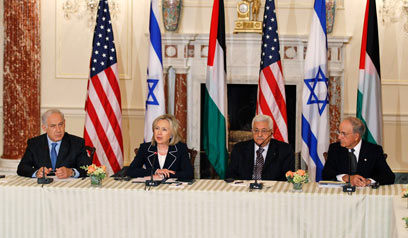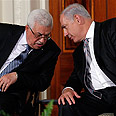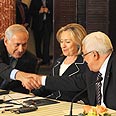Direct talks underway: Prime Minister Benjamin Netanyahu and Palestinian Authority President Mahmoud Abbas met one-on-one Thursday under the supervision of US Secretary of State Hillary Clinton, after a series of speeches launched direct peace negotiations.
A spokesman for US President Barack Obama was optimistic, and said the president is encouraged by the seriousness shown by both sides. His evoy to the Middle East, George Mitchell, told reporters that the leaders had agreed to convene a second round of talks Sept. 14-15, and every two weeks thereafter.
"President Abbas and Prime Minister Netanyahu are committed to doing what it takes to achieve the right result," Mitchell told reporters, adding that both he and Clinton would attend the September talks.
Mitchell said both sides agreed that the talks were sensitive and that they would therefore release little information about details of their discussions.
But he said they agreed that the first item on the agenda would be to work up a "framework agreement" to establish the fundamental compromises necessary to reach a final deal within a year.
'Freeing peoples from shackles of history'
Earlier, Palestinian delegation members were first to enter the room in which a round of speeches kicked off the talks. About 15 minutes later, Israel's negotiation team – which includes Ambassador to the US Michael Oren and Netanyahu's advisor Uzi Arad – came in the room, followed by Netanyahu, Abbas, and Clinton a few minutes later.
Clinton then formally opened the first direct peace talks between Israel and the Palestinians in nearly two years, imploring the two sides to make compromises to forge an agreement.
In a ceremony at the State Department, Clinton said the Obama Administration is committed to reaching a settlement in a year's time. But she stressed that after decades of failed attempts the main work belongs to Israeli PM Netanyahu and Palestinian President Abbas.
"By being here today, you each have taken an important step toward freeing your peoples from the shackles of a history we cannot change and moving toward a future of peace and dignity that only you can create," she said.
"We cannot and we will not impose a solution," Clinton said.
"I know the decision to sit at this table was not easy," she added. "We understand the suspicion and skepticism that so many feel borne out of years of conflict and frustrated hopes."
Bibi willing to go 'long way in short time'
Next, PM Netanyahu said the talks marked an "unprecedented opportunity" to end a 100-year conflict. The prime minister stressed that the two pillars of an agreement would be security and legitimacy.
Netanyahu said on Thursday he was willing to go "a long way in a short time" to achieve peace with the Palestinians, but said the road ahead would be difficult.

Direct talks launched (Photo: Reuters)
"The people of Israel, and I as their prime minister, are prepared to walk this road and to go a long way - a long way in a short time - to achieve a genuine peace that will bring our people security, prosperity and good neighbors," he said.
Meanwhile, President Abbas called on Israel to end all settlement activity and to totally remove its embargo on the Hamas-controlled Gaza Strip.
"We call on the Israeli government to move forward with its commitment to end all settlement activities and completely lift the embargo over the Gaza Strip," Abbas said.
'I seek historic compromise'
Wednesday night, the leaders outlined their vision for the talks, expressing optimism that an agreement could be secured despite past failures.
Speaking at a joint press conference Wednesday, Netanyahu said he arrived in Washington in order to find a "historic compromise," turning to Abbas and declaring "you are my peace partner."
Netanyahu stressed that he was seeking lasting peace that will "last for generations," rather than a "brief interlude between wars."
The Palestinian president also addressed Netanyahu, while condemning the two recent shooting attacks in the West Bank at the end of his speech.
"We do not want any blood to be shed," he said. "We want people in the two countries to lead normal lives."
The Washington summit is attended by other Arab leaders, Jordan's King Abdullah and Egyptian President Hosni Mubarak. The Jordanian leader warned that the price of failure in the peace process will be grave for all parties involved.
Yitzhak Benhorin, Reuters, and AP contributed to the story
- Follow Ynetnews on Facebook

















